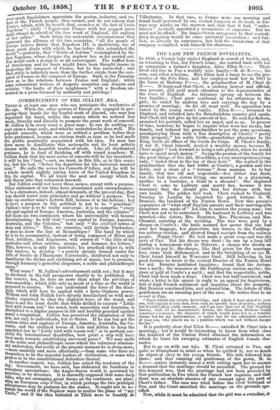COMMENCEMENT OF THE JULLIEN ERA.
Taman is at least one man who can anticipate the tendencies of the age. While the other powers of Europe are engaged in pre- paring their bands for the fearful work of discord, one man has organized his band, unlike the armies which we noticed last week, literally and directly to promote the great work of concord. M. Jullien is in every sense a great man ; he can do nothing ex- cept upon a large scale, and what he undertakes he does well. His popular concerts, which were so critical a problem before they were performed, became an obvious truth as soon as he had made the public practically acquainted with his idea. No man has done more to familiarize this metropolis and its least artistic classes with the heartfelt truths of music. Like all rhythmical geniuses, he is fond of finishing off with round numbers : M. Jullien finds that his next series of concerts will be his twentieth ; it will be his "last,"—not, we trust, in this life, or in this coun- try, but his last, "before his departure for his universal musical tour." He calls the series his Concerts d'Adieu, and he will be a whole month nightly taking leave of the United Kingdom in this its capital. We all know the soul and energy which he will throw into that reiterated farewell.
But Jullien could not leave these scenes, except with a purpose. Other statesmen of our time have abandoned such encumbrances : to be a statesman, indeed, almost demands, at the present day, that you should waive your principles and go without a purpose. You take up another man's Reform Bill, because it is the fashion; but to have a purpose in life political is not to be "practical." Jullien's tour is to be really universal ; it is to comprise "every city and capital of Europe, America, Australia, and, the colonies"; ; but there are two continents where his universality will become discriminating: he will visit "every capital in Europe, America, Australia, and the Colonies," but only "the civilized towns of Asia and Africa." This, we conceive, will include Timbuctoo ; or does he draw the line at Mozambique? The band by which he is to be accompanied, instead of being composed of Horse and Foot, .Artillery, and Engineers, will consist of "the elite of his orchestra and other artistes, savans, and hommes des lettres." This, however, is only his materiel; his practical object is with this nucleus, to develop " a society already formed under the title of Societe de PHarmonie Universelle, instituted not only to amiliarize the divine and civilizing art of music, but to promote, through harmony's powerful eloquence, a noble and philanthropic Cause.
What cause? M. Jullien's advertisement saith not ; but it may be disclosed in the full prospectus shortly to be published. In this reserve, too, he does no more than adopt the privilege of statesmanship ; which tells only as much at a time as the world is prepared to receive. We can understand the force of the disci- pline which will here be applied with a forty-Orpheus power. Williem and John Hullah have already familiarized us with mul- titudes organized to obey the slightest wave of the wand, and there is not the least doubt that while drilled to execute "Little bird with bosom red," the mind, both masculine and feminine, is disciplined to a higher purpose in life and forcibly guarded against many a temptation. Jullien has perceived the adaptation of this law, not only to individuals, but to States. If he can but get the various cities and capitals of Europe' America, Australia, the Co- lonies, and the civilized towns of Asia and Africa to keep the appointed law in "Little bird with bosom red," or to perform cor- rectly the International Quadrilles, how great a step will have been made towards establishing universal peace? We may smile at the noble and philanthropic cause which the volunteer mission- ary undertakes but really at the present moment he is doing more, more candidly and more effectually,—than some who have set themselves to be the imperial leaders of civilization, or some who profess to be the constitutional defenders thereof. In another respect, too, Jullien has seized the tendency of the aty. Government, we have said, has abdicated its functions to voluntary associations ; the Anglo-Saxon world is governed by tccieties, or by directors. It is shrewdly supposed that some deep re, who are arranging great forces on the continent, are plan- nIng an European coup cretat, in which perhaps the two principal adyenturers may be partners for the stakes. It ought not to ate- tallish the world if the Nephew were to realize the plans of " my Uncle," and if the idea initiated at Tilsit were to fructify at
Villafranea. In that case, as France woke one morning and found itself governed by one elected Emperor at its head, so Eu- rope may awake on the morrow and find that it had, "unbe- known" to itself, appointed a triumvirate of emperors. But we need not be afraid : the Anglo-Saxon antagonist to that central- izing despotism would be some universal association ; and Jul- lien, as already he announces, has laid the foundation of that company unlimited, with himself for chairman.


























 Previous page
Previous page